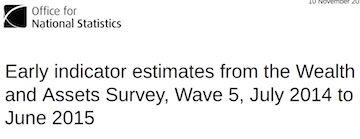A survey assessing the economic well-being of households and factors that affect their Financial Planning showed that paying into an employer pension scheme was considered to be the safest way to save for retirement.
Private households were surveyed for the Wealth and Assets Survey, carried out by The Office for National Statistics.
Some 41% of individuals said for the period July 2014 to June 2015 they believed an employer pension scheme was the safest way to save for retirement.
Investing in property was considered the second safest way, with 28% of respondents listing this.
When asked which method of saving for retirement was likely to make the most of their money, 44% said investing in property and 25% responded that paying into an employer pension scheme would be.
The proportion of people not currently contributing towards a pension, who gave the reason for this to be due to low income, not working or still in education, rose from 38% during July 2010 to July 2012 to 50% in July 2014 to June 2015.
The percentage of people “very confident” or “fairly confident” their income in retirement will provide the standard of living they hope for, increased from 41% in July 2010 to June 2012 to 52% in July 2014 to June 2015.
The proportion of individuals keeping up with all bills and credit cards without difficulty increased 10 percentage points, from 53% in July 2012 to June 2014 to 63% in July 2014 to June 2015.
The percentage of people reporting their debt burden as “not a problem at all” rose from 66% during July 2010 to June 2012 to 75% in July 2014 to June 2015.
Tom McPhail, head of retirement policy at Hargreaves Lansdown, said: “The combination of employer contributions, tax relief, secure trust laws, investment diversification and control over the withdrawals make workplace pensions the obvious default retirement saving vehicle.
“It is also notable that outside the South East, investment returns from pensions have been higher than property too.
“However, for many people now approaching retirement, their property is likely to make a significant contribution to their overall wealth in retirement and will be particularly relevant as a capital reserve for costs such as later-life care.”

